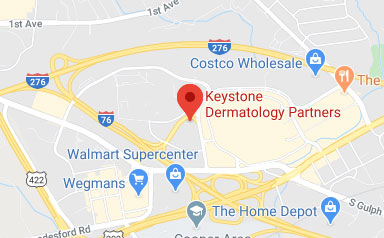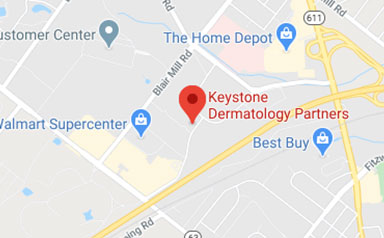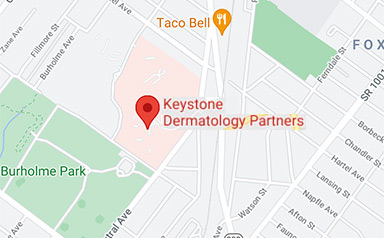Conveniently located to serve Philadelphia, King of Prussia, and surrounding areas
Patients looking for treatment options for Basal Cell Carcinoma in Philadelphia are advised to contact Keystone Dermatology Partners. Our skilled dermatologists are well-versed in treatment of skin cancer, along with a number of other skin issues.
What Is Basal Cell Carcinoma?
Basal Cell Carcinoma (BCC) is a kind of skin cancer that affects the basal cells. Basal cells are one of the three types of skin cells that form the upper layer of the skin. These cells are responsible for generating new skin cells when the old ones die. BCCs are caused when triggers such as ultraviolet radiation cause changes in these cells, leading to their uncontrolled growth.
What Are the Causes of Basal Cell Carcinoma?
Previously known as Basal Cell Epithelioma, BCC tends to affect those parts of the skin that experience the most sun exposure. Prolonged exposure to the sun’s ultraviolet rays is the primary cause of basal cell carcinoma.
When ultraviolet rays hit the skin, with time, they damage the DNA in the skin cells. This DNA contains the code that helps these cells grow, and when it gets damaged, Basal Cell Carcinoma can occur.
Basal Cell Carcinoma can also be acquired due to genetic defects and high exposure to tanning beds.
Experts claim that people with fair skin have more chances of acquiring basal cell carcinoma than those with darker skin tones.
What Are the Symptoms of Basal Cell Carcinoma?
Generally, Basal Cell Carcinoma develops at a slow pace. Most of the time, patients remain unaware of skin cancer for years until it starts showing more prominent signs.
The symptoms of Basal Cell Carcinoma differ from individual to individual. The first signs of BCC appear as small pearly bumps on the skin. Usually, they are visible on the nose or other sections on the face. They may also form on other body parts, such as the legs and arms.
People with Basal Cell Carcinoma commonly experience any of the following changes:
- A shiny white, pink, or skin-colored bump on the skin. These bumps are quite translucent, and people can often see their blood vessels through them.
- A brown, blue, or black lesion (the damaged tissue or organ)
- Flat and scaly red patches
- A white and waxy lesion that looks like a scar (This is the least common symptom.)
There is a very low probability of this cancer moving from the skin to other parts of the body. However, it can spread into nearby body tissues and bones under the skin.
Types of Basal Cell Carcinoma
Many kinds of Basal Cell Carcinoma exist. Some of them include:
- Nodular BCC – This is the most common facial Basal Cell Carcinoma.
- Superficial BCC – This type is more prevalent in younger adults.
- Morphoeic BCC – This generally appears in mid-facial sites.
- Infiltrated BCC – This type commonly appears on the upper abdomen or on the face.
Although Basal Cell Carcinoma is very common, it is the least risky type of skin cancer. If you observe significant changes in the skin or experience any of these symptoms, it is advisable to consult a doctor.
Treatment Options
A number of treatment options are available for BCCs.
Mohs Surgery: This process involves removal of the lesion and lab analysis to ensure that all traces of cancerous cells have been removed. If more cancerous cells are present, a very small amount of skin is carefully removed and analyzed; this is repeated until all cancerous cells are gone.
Cryotherapy: The BCC is frozen with liquid nitrogen, causing the cells to die and the lesion to fall off.
Curettage and Cautery: The lesion is removed using a tool called a curette, and then the resulting wound is cauterized with heat.
Topical Medications: Creams like 5-percent fluorouracil cream and Imiquimod can be applied to the BCC to kill the cancerous cells.
Schedule Your Consultation
At Keystone Dermatology Partners, our experienced dermatologists will diagnose your Basal Cell Carcinoma in Philadelphia and recommend the proper treatment method. Contact us today for your consultation.





